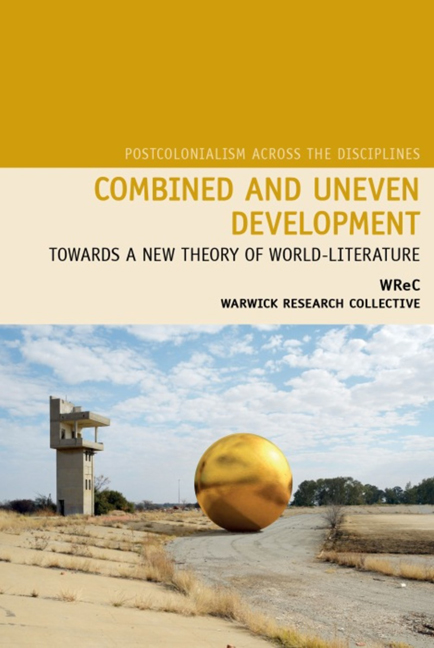Book contents
- Frontmatter
- Dedication
- Contents
- A Note on Collaborative Method
- 1 World-Literature in the Context of Combined and Uneven Development
- 2 The Question of Peripheral Realism
- 3 ‘Irrealism’ in Tayeb Salih's Season of Migration to the North
- 4 Oboroten Spectres: Lycanthropy, Neoliberalism and New Russia in Victor Pelevin
- 5 The European Literary Periphery
- 6 Ivan Vladislavic: Traversing the Uneven City
- Works Cited
- Index
4 - Oboroten Spectres: Lycanthropy, Neoliberalism and New Russia in Victor Pelevin
- Frontmatter
- Dedication
- Contents
- A Note on Collaborative Method
- 1 World-Literature in the Context of Combined and Uneven Development
- 2 The Question of Peripheral Realism
- 3 ‘Irrealism’ in Tayeb Salih's Season of Migration to the North
- 4 Oboroten Spectres: Lycanthropy, Neoliberalism and New Russia in Victor Pelevin
- 5 The European Literary Periphery
- 6 Ivan Vladislavic: Traversing the Uneven City
- Works Cited
- Index
Summary
In its blind unrestrainable passion, its were-wolf hunger for surplus-labour, capital oversteps not only the moral, but even the merely physical maximum bounds of the working day. It usurps the time for growth, development, and healthy maintenance of the body. (Karl Marx 1965: 24)
Recently, Stephen Shapiro has proposed a re-reading of forms of catachrestic narrative through the prism of world-systems theory in order to pinpoint how narrative devices and modes such as the gothic re-emerge at similar moments in the recurring cycles of long-wave capitalist accumulation (Shapiro 2008: 31). Similarly, anthropologist Michael Taussig has observed that cultural formations consisting of fantastic or magical reactions to ‘nonfantastic’ reality frequently arise in peripheral societies as a critique of their violent integration into capitalist modes of production, focusing specifically on the figuration of oil as ‘devil's excrement’ within countries converted to petro-regimes (Taussig 2010: 10, 18). The capitalist world-system, however, should also be understood as a world-ecology, in which the social transformations corresponding to different phases of capitalism are inextricable from the reorganisation of nature–society relations. Environmental historian Jason Moore argues that capitalism consists of ecological regimes, ‘those relatively durable patterns of class structure, technological innovation and the development of productive forces […] that have sustained and propelled successive phases of world accumulation’ (Moore 2010: 392). Under the compulsion of capital's expansionary logic, ecological regimes are periodically driven to exhaustion. These cyclical, systemic occurrences correspond to upswings in gothic and supernatural tropes that register the conjuncture of fading and emergent regimes, prognosticating a revolution in nature–society relations even more pervasive and traumatic than the last. Moreover, when ecological regimes are organised around the production/extraction of single commodities, as is often the case in peripheries and former colonies, the use of catachrestic narrative devices in speculative fiction serves to mediate the intense sensations of spectrality and phantasmagoria resulting from the hyper-commodity fetishism associated with monocultural socio-ecologies.
We have argued above that the ‘critical irrealist’ aesthetics of texts such as Salih's Season of Migration to the North register the impact of combined and uneven development in the colonial periphery.
- Type
- Chapter
- Information
- Combined and Uneven DevelopmentTowards a New Theory of World-Literature, pp. 96 - 114Publisher: Liverpool University PressPrint publication year: 2015



